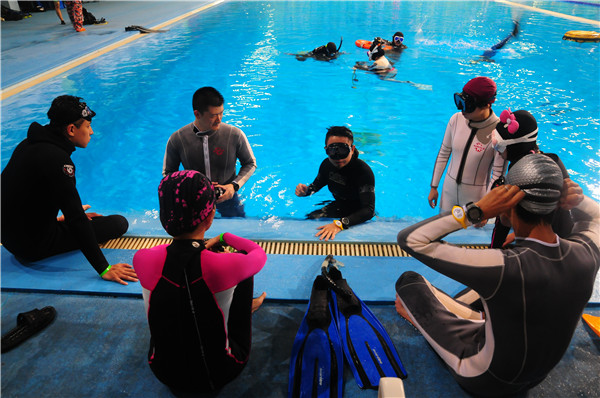Deep down into the big blue
By Xing Yi ( China Daily ) Updated: 2016-10-29 07:01:55
 |
|
Zhuang Ni (center), a Chinese instructor, teaches an introductory course of freediving in Ying Tung Natatorium in Beijing. [Photo by Xing Yi/China Daily] |
In another competition in Bali, Indonesia, in August, he improved on that, diving to 96 meters. The world record of the discipline is 128 meters, held by Alexey Molchanov of Russia.
"It has opened a door for me to another world," says Wang, who quit his job in finance and founded one of a few emerging freediving clubs in China, Freefall, in 2014.
Last month Wang and three Chinese freedivers took part in the Team World Championship held by an international freediving association AIDA in the southern Greek port of Kalamata, the first time a team from China has competed with other countries.
In the competition, Lu Wenjie, 31, a Chinese freediver who lives in Hawaii, broke the national women's record with a depth of 72 meters in the CWT constant weight discipline.
Lu, who was born in Changzhou, Zhejiang province, attended Peking University. After graduation, Lu studied in the US for doctorate in medicine. She was certified as a scuba diver during a trip to Hawaii in 2010.
Enamored with the ocean and diving, she moved to Hawaii in 2012 and learned freediving in 2014. She now holds all Chinese women's records in the sport's six disciplines.
"Compared with scuba diving, in which you can lap up the underwater world on a long dive, freediving is more about one's inner world," Lu says.
Anyone who practices holding their breath will first feel uncomfortable, then anxious and finally, as panic sets in, will give up, she says. However, with determined training most people will accustomize themselves to the feeling and gradually feel more at ease.
"In everyday life when you come up against difficulties you can be full of anxiety, too. Freediving has taught me to me to deal better with such situations."
Lu's personal best for holding her breath is eight minutes, a national record that exceeds that of the record for men, 6 minutes 28 seconds, held by Wang.
Lu now works as an independent medicine consultant and teaches freediving part time in the Hawaiian town of Kona.
Wang and Lu estimate that there are as many as 6,000 certified freedivers in China, and the number is growing rapidly, they say. To register in a beginner's course preplanning is advised, because courses can be booked out months in advance.
Some Chinese travel to Southeast Asia, to places such as Phuket island in Thailand or Bohol island in the Philippines, to learn and practice freediving.
Those who choose to stay in the country usually begin with an introductory course in diving pools and then travel to Suzhou, where there is a 16-meter deep diving tank, or Nanning, where there is a deep lake called Sheng Long Tan.
"More and more people in China are keen to pursue a sense of individuality, and of being different from others," says Zhao Lei, one of the first freediving instructors in China, talking of the rising popularity of freediving.
Zhao, who was inspired by the 1988 168-minute Luc Besson movie Le Grand Bleu (The Big Blue), about the friendship and rivalry between two freedivers, became an instructor in 2013. He says he has trained about 800 people and founded One Breathe Freediving Club last year.
"My students are active in many sports - they ski, run marathons, and kite surf. Freediving is becoming popular among Chinese who have a heart for sport and adventure.
"I don't consider it an extreme sport but a new lifestyle; Competition is just one small part of it."
|
|
|
|
|
|
|
|

























 Raymond Zhou:
Raymond Zhou: Pauline D Loh:
Pauline D Loh: Hot Pot
Hot Pot Eco China
Eco China China Dream
China Dream China Face
China Face






